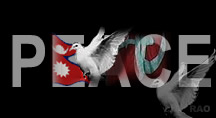| September
2006 |
| Rebels
and government to hold decisive peace talks |
 |
 |
| »
Maoist rebel leaders and Nepal's seven-party interim government will hold
talks within 10 days in an effort to rekindle the faltering peace process,
designed to end a decade-long conflict in the Himalayan country.
Over
the past five months, the Maoists and the seven parties have been actively
engaged in the peace process following the end of the absolute rule of
the Nepalese monarch, King Gyanendra, after a mass uprising in April.
However,
concerns are rising on both sides about a growing mistrust between them
and the lack of effective progress on ending violent in the kingdom, according
to members of the negotiating teams.
 |
Full
story ... |
|
|
| August
2006 |
| Government
and Maoists reach agreement over UN's role |
 |
 |
» Breakthrough: The
Nepalese government and Maoist rebels have reached agreement on the supervision
of their weapons, an issue that has impeded their peace talks.
The
government has agreed that its troops will be confined to their barracks,
while the rebels say their arms will be kept in one set of camps, the statement
said.
»
UN role: The United Nations received separate requestsfrom the Government
of Nepal and the country's Maoists calling for wide-ranging UN assistance,
including ceasefire and human rights monitoring, in a peace process that
aims to end 10 years of conflict. |
|
| July
2006 |
| United
Nations sends assessment team |
 |
 |
The
following statement was issued today by the Spokesman for UN Secretary-General
Kofi Annan:
Recent
developments have provided an unprecedented opportunity to achieve a negotiated
political solution to Nepal's 10-year armed conflict. With that in mind,
the Secretary-General has decided to send a team to Nepal to discuss the
proposed United Nations assistance in the peace process. Through consultations
with all concerned, the mission will seek a common understanding of the
nature and scope of responsibilities the United Nations could undertake
in the peace process. The assessment team will be led by Staffan de Mistura,
and is scheduled to be in Nepal between 26 July and 3 August 2006. |
|
| June
2006 |
| Second
round of Peace talks |
 |
 |
The
second round of talks between the Government and CPN (Maoist) has been
started in Lalitpur on 15 June 2006. Setting up a mechanism to monitor
the ceasefire code of conduct and various political issued including the
constituent assembly are likely to be today's agenda.
The
Goverment and the Maoist rebels reached 4-point agreement. The Government
and the Maoist rebels agreed to hold summit talks between PM Koirala and
Maoist Chairman Prachanda; form a truce monitoring team (Ceasefire Code
of Conduct National Monitoring Committee); request the UN to assist the
truce monitoring team and to monitor human rights; and to hold further
talks under observers. |
|
| May
2006 |
| Ceasefire
Code of Conduct agreed between Government of Nepal and CPN (Maoists) |
 |
 |
| The
Government of Nepal and the CPN (Maoist) have issued a 25 point ceasefire
Code of Conduct on 26 May 2006 after a first round of formal dialogue between
the two sides. |
|
| May
2006 |
| First
round of Peace talks |
 |
 |
Peace
talk between Nepal Government and Maiosts began on 26 May 2006 at
4:00pm in Kathmandu.
A
25-point Code of Conduct governing the ceasefire was signed by Home
Minister Krishna Sitaula on behalf of Nepal Government and Krishn Bahadur
Mahara, Coordinator of the Maoist Team. Emphasizing the commitment of holding
constituent Assembly pursuant to the 12-point consensus between Seven Party
Alliance and Maoists, an agreement to publisize the Code of Conduct was
reached. |
|
| May
2006 |
| Maoists'
roadmap for holding dialog |
 |
 |
| The
Maoist roadmap to hold talks with the SPA (Seven Party-Alliance) government
is:
declaration
of a ceasefire; finalisation of code of conduct; formation of talks team;
release of political prisoners; starting talks; dissolution of the old
parliament, constitution and government; formation of an interim guideline
and government by holding a political conference with representation from
the political parties, civil society and renowned personalities of different
sectors; setting of electoral constituencies by ensuring the representation
from people of all classes, castes, sectors and genders; holding constituent
assembly elections under reliable international supervision; and restructuring
of the whole state structures including the People's Liberation Army (PLA)
and the Royal Nepalese Army (RNA) as per the popular mandate expressed
through the (constituent assembly) elections. |
|
| May/April
2006 |
| Government:
Offer for peace talks - Maoist rebels agree to peace talks |
 |
 |
| The
new Nepalese Prime Minister G. P. Koirala has urged Maoist rebels to end
violence and join peace talks. "I request (the Maoists) to renounce violence
and come to the process of dialogue," the PM said. Nepal's interim government
has declared a ceasefire on May 2, 2006. The Maoist rebels have declared
a ceasefire some days earlier.
In
a statement the CPN (Maoist) welcomed the ceasefire. The Maoists are now
ready for negotiations and to join the interim government. The statement
affirms the commitment to the 12-point understanding reached with the SPA. |
|
|












